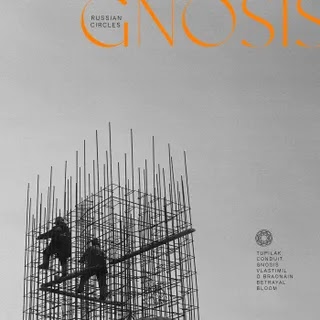On its dauntless and electrifying eighth album, the post-metal trio recharges its familiar sound.
Long before the twinkling fifth track of Russian Circles’ Gnosis ends, it is easy to assume how the sixth will begin—a torrent of aggression, the inverse of its soothing predecessor. “Ó Braonáin” is sublime guitar music for the gloaming; each soft note of the 100-second lullaby feels gently warped, like the glow of a summer sun setting behind a thunderhead. The instant it fades, “Betrayal” rushes forward, a blitz of wordless black metal obliterating that sense of twilight languor. It sounds like a street fight. At least in this two-song span, Russian Circles sound like they’ve mastered the expected post-metal script: a ceaseless seesaw of quiet and loud, gorgeous and violent.
But Russian Circles’ eighth album works so well because that flipped-switch dynamic is the sole exception to what seems a new rule for the Chicago trio: The beautiful and the brutal should exist in tandem, not split into stereotypical patterns. Gnosis is a perpetual motion machine, its serrated guitars and blown-out bass forever pirouetting around or slamming into drums that make this music dramatic and restless. Russian Circles debuted nearly 20 years ago, after bands like Explosions in the Sky, Mono, Pelican, or even Isis filled in the blank that followed “post- ” with foundational records. As dauntless as it is electrifying, Gnosis is also efficient and lean, qualities that together recharge a familiar sound that’s not been in vogue for a long time. These nimble and mighty songs close that gap, at least for 40 minutes.
Two logistical hurdles of the pandemic served as surprising boons for Russian Circles. First, rather than collectively constructing songs in a rehearsal room, the members wrote full pieces in the isolation of new home studios. When at last they reconvened to record at Kurt Ballou’s God City and Steve Albini’s Electrical Audio, they mostly knew how this material moved, eliding the compromises that collaboration can introduce. And when they originally handed Gnosis over to their label, it was a double-LP, apparently loaded with the sorts of peaks and valleys epitomized by “Ó Braonáin” and “Betrayal.” Supply-chain woes meant they had to prune Gnosis to one record. In recent years, Russian Circles’ albums have sometimes felt like shaggy-dog stories, loaded with tangents as they explored new ideas; the time constraint doesn’t allow it.
At least until Gnosis reaches its solo guitar reverie, it is total momentum, each song finding a target and doggedly pursuing it. Named for an Inuit totem that was dropped into the sea to hunt down an enemy, opener “Tupilak” could score a chase scene. Guitarist Mike Sullivan and bassist Brian Cook follow the steady acceleration of drummer Dave Turncrantz, their viscous parts funneling through tight grooves like a car navigating hairpin turns. “Vlastimil” begins with magisterial doom, its grim-reaper riff cutting a path through lumbering drums. But Russian Circles alternately slingshot into black metal outbursts, droning breakdowns, and delirious thrash before fading into exhaustion. This is the sensation—compacted into seven minutes—of beating a video game, then collapsing on the floor in a puddle.
In changing their process and trimming the results, Russian Circles didn’t entirely forsake their outbound interests, the sounds that have sometimes adulterated their records. Instead, they folded them inside these tunes, with Cook in particular making striking contributions. His hyper-distorted bass during the title track adds textural frisson, like hearing a favorite song on a half-broken transistor radio. His synthesizer lines often provide a sense of wonder to the taut compositions, gorgeous streaks beneath otherwise-gnarly tones. This carefully layered approach piques interest without interrupting Gnosis’ sheer energy.
Gnosis ends with “Bloom,” the first song Russian Circles wrote for the album. A wistful shuffle with plangent guitars that stretch across an especially wide horizon, it is the lightest full-band fare here, so delicate it sidles up alongside the heavy cinematics of Explosions in the Sky. These respective bands are now surviving exemplars of post-rock and post-metal, twin terms that once suggested unfettered imagination but now mostly connote loud-quiet-loud instrumental guitar jams. Explosions have found subtle ways to creep around such binaries, while Russian Circles have spent much of the last decade pushing directly against old edges. Gnosis, however, represents a return toward the radiant center, to the idea that a power trio can make urgent and emotive music with little but the basics and a reason for revisiting them.



0 comments:
Post a Comment